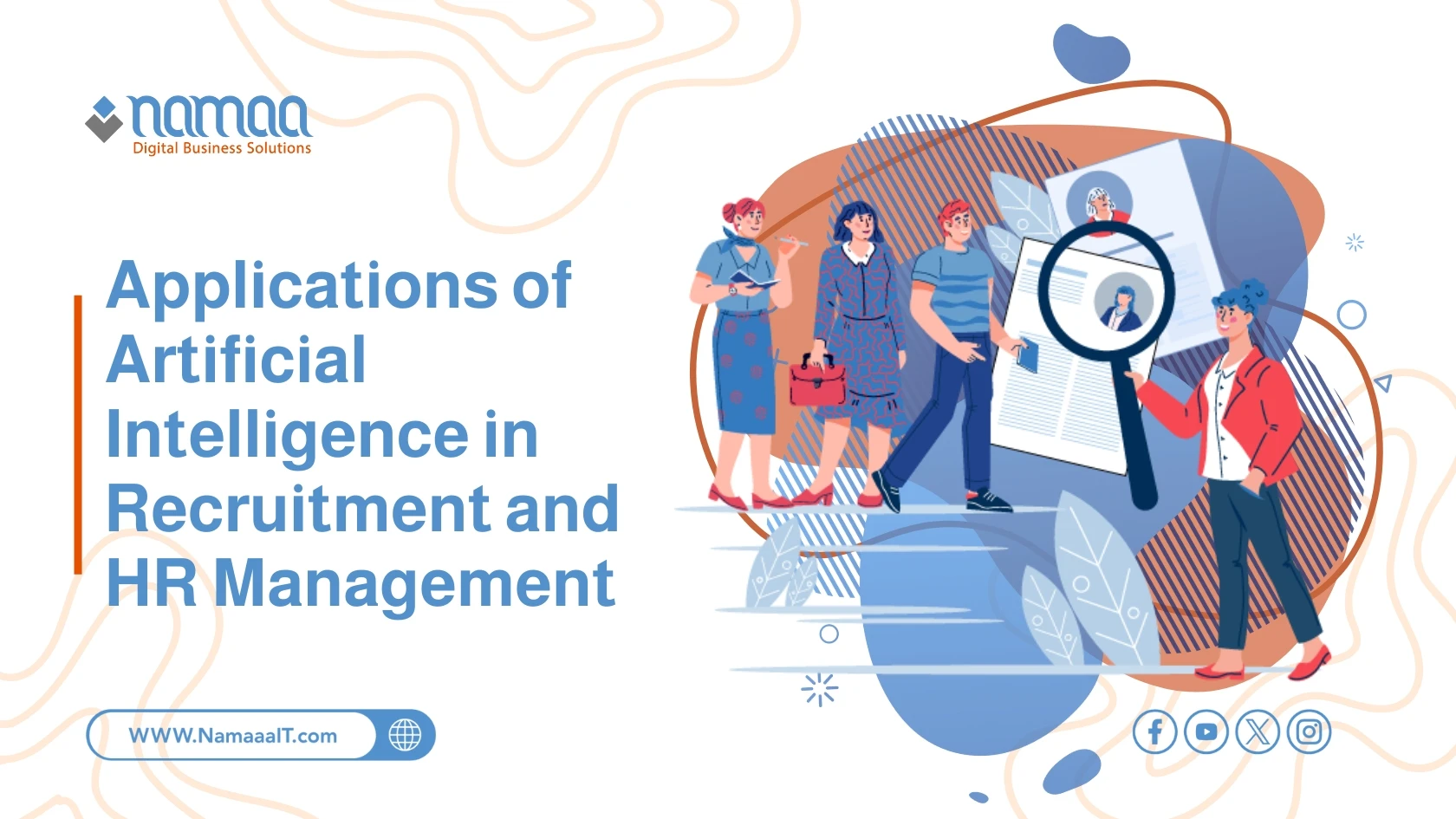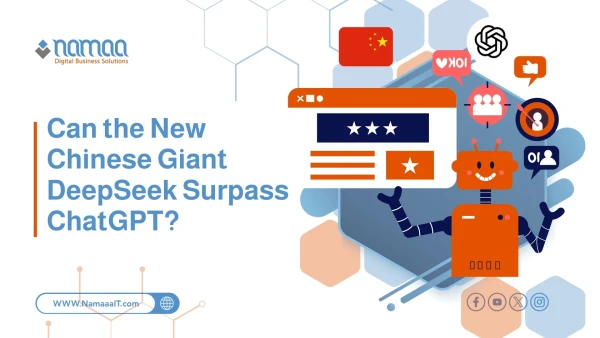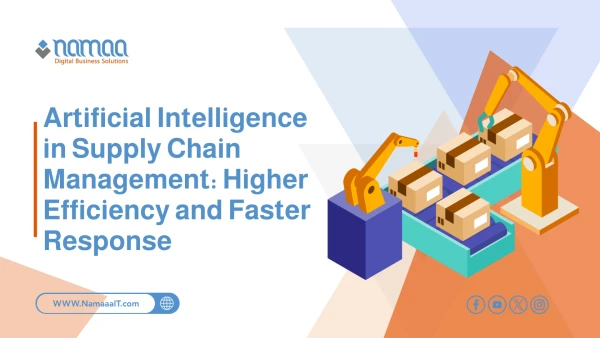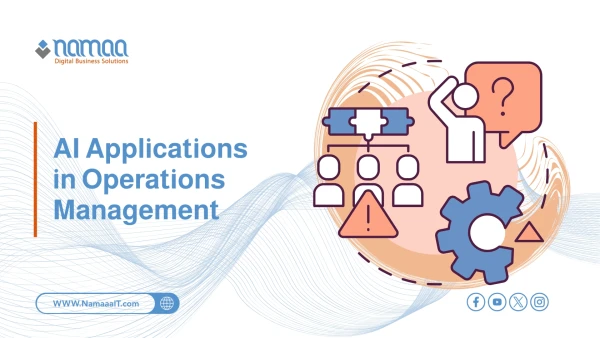Artificial intelligence (AI) applications in recruitment and human resources management have become one of the most significant digital transformations reshaping the modern workplace. Amid growing challenges in the labor market, organizations are seeking to improve the efficiency of their recruitment and HR operations by adopting AI technologies.
These applications are used to analyze resumes and identify the most suitable candidates for jobs, reducing personal biases and enhancing fairness in selection. They also contribute to evaluating employee performance and providing recommendations for skill development, thereby boosting productivity and job satisfaction. Additionally, AI is used in managing attendance, analyzing payroll and bonuses data, and making strategic decisions based on accurate data.
The Importance of AI Applications in Recruitment and HR Management
1. Automating Recruitment Processes
Automating recruitment using AI is one of the most impactful applications, helping to accelerate and simplify these processes. Traditionally, recruitment was time-consuming due to the manual review of resumes, repeated interviews, and analysis of vast data volumes. With AI, many routine tasks can now be automated, such as resume classification and candidate filtering based on specific criteria like qualifications and prior experience.
Algorithms classify applicants according to pre-set criteria, enabling HR professionals to focus on a shortlist of the most compatible candidates. This not only speeds up the process but also reduces human errors and personal biases during candidate selection.
2. Enhancing Candidate Experience
Candidate experience is a crucial factor affecting an organization's image and its ability to attract talent. AI contributes significantly to improving this experience. Using tools like virtual assistants, candidates can interact with the system throughout the recruitment stages, creating a positive impression of the company. These systems provide quick, reliable responses regarding candidates’ status in the process and offer tips for improving resumes or interview skills.
AI also offers innovative ways to enhance communication with candidates via various channels such as email, online chat, or interactive voice calls, making the process smoother and more flexible.
3. Data Analysis and Forecasting Future Needs
A key advantage of AI is its ability to handle and analyze large volumes of data quickly and accurately. In recruitment and HR management, AI analyzes market data and current employee data to forecast future workforce needs. For example, AI can identify times when there’s an increased need for new hires based on upcoming projects or growth plans.
It can also analyze trends in employee performance and predict which human resources might need adjustments in the future. For instance, by analyzing job performance, training, and development data, the system can suggest which employees are ready for promotion or need further training to enhance their skills.
4. Reducing Bias in Hiring
Bias in recruitment remains a challenge for many companies. HR professionals may often rely on personal impressions or social backgrounds in their evaluations. AI helps reduce such biases through objective data analysis. Instead of relying on emotions or individual biases, algorithms assess candidates' skills, experience, and academic qualifications impartially.
AI enables hiring decisions based on precise, objective criteria, promoting fairness in recruitment processes. It can also improve workplace diversity and inclusion, increasing equal employment opportunities for all applicants.
5. Managing Employee Affairs with AI
AI's role isn't limited to recruitment—it extends to managing employee affairs as well. AI can monitor performance, analyze attendance and leave data, and support strategic decision-making based on accurate insights. It can also recommend skill development or identify training needs to enhance overall employee performance.
Furthermore, AI can optimize salary and rewards systems based on performance, working hours, and achievements. Smart tools also offer efficient solutions for managing social insurance and employee-related services, saving time and effort while improving employee satisfaction.
6. Improving Work Environment and Employee Engagement
By analyzing data related to employee engagement and satisfaction, AI can continuously enhance the work environment. These tools can predict potential issues like stress or lack of motivation and propose early solutions. AI can also strengthen communication among employees through smart tools that facilitate effective interaction.
AI technologies help improve employee wellness programs by identifying the benefits and perks that matter most to employees based on their behavior and personal needs. This increases loyalty and employee commitment.
Learn more: AI Applications in E-Commerce
Top AI Programs in Recruitment and HR Management
With the recent advances in artificial intelligence, AI-powered programs have become an integral part of company strategies in managing recruitment and HR. These programs offer innovative solutions that enhance efficiency and improve recruitment, training, and performance evaluation processes. Below are some of the most prominent AI tools used in HR management, along with real-world examples and supporting statistics:
1. Resume Analysis Programs (Applicant Tracking Systems - ATS)
ATS (Applicant Tracking Systems) are among the most widely used recruitment tools. They streamline and improve the process of filtering resumes. ATS relies on AI to analyze keywords, skills, and job experiences within resumes, then filter out the most suitable candidates.
For example, the company iCIMS uses a smart ATS to help employers classify and analyze job applicants. According to iCIMS statistics, 90% of large U.S. companies use ATS software for recruitment. Another study showed that these systems reduce resume screening time by up to 75%, allowing HR teams to focus on the most relevant candidates.
2. Predictive Hiring Software
Predictive hiring tools are among the latest AI innovations in HR. These programs analyze big data to forecast employee performance post-hiring. By examining historical performance and market trends, they can identify candidates most likely to succeed in a given role.
For instance, HireVue uses AI to analyze interview videos and identify the best-fit candidates. A study published in Harvard Business Review showed that predictive hiring tools improve candidate selection accuracy by up to 30% compared to traditional methods. Additionally, statistics reveal that 75% of companies using these tools reported significant improvements in hiring quality and decision-making speed.
3. AI-Based Employee Training Programs
AI-powered training programs enhance employee skills in a personalized manner. AI identifies each employee’s training needs based on performance and personal data. Using machine learning algorithms, these systems deliver training content tailored to each employee’s skill level and professional goals.
One of the most important AI-powered training platforms is LinkedIn Learning, which uses artificial intelligence to provide personalized training recommendations for employees based on their past activity data on the platform. According to LinkedIn Learning, 70% of companies that utilized smart training technologies reported that AI-based training was more effective in improving employee performance compared to traditional methods. A study by McKinsey also showed that companies using AI in employee training saw a 20% to 30% increase in productivity.
4. AI-driven Performance Management Systems
AI-based performance management systems contribute to continuous improvement in evaluating employee performance. By collecting data related to achievements, working hours, and interactions with colleagues, these systems can provide accurate reports that assist in decisions regarding promotions and rewards.
For example, Betterworks uses AI to analyze performance data and provide comprehensive reports to organizations. According to a Gallup study, companies using smart performance management programs saw a 14% increase in employee satisfaction compared to those that do not. Statistics also show that 85% of employees in companies using such programs feel they receive more accurate and objective evaluations.
5. AI-based Employee Engagement Tools
AI tools focused on enhancing employee engagement are among the most important for improving the work environment. These systems collect data on employee behavior, such as participation in internal activities, event involvement, and satisfaction levels. Based on this data, they provide recommendations to improve engagement and motivation.
One of the top tools in this area is TINYpulse, which uses AI to analyze employee sentiment and motivation through monthly surveys. According to TINYpulse statistics, companies using this tool saw a 19% improvement in employee engagement and job satisfaction. A Gallup study also showed that companies using smart engagement tools experienced a 40% decrease in turnover rates.
6. AI-powered Virtual Assistants
Smart virtual assistants have become an integral part of HR management, helping employees with routine tasks such as submitting leave requests, inquiring about internal policies, or answering frequently asked questions about salaries. By using AI technology, virtual assistants can handle employee requests efficiently, reducing the burden on HR teams.
A prominent example is Workday Assistant, which provides instant support to employees for HR-related issues. According to Workday statistics, companies using smart assistants experience a 50% reduction in time spent on routine HR tasks, allowing employees to focus more on strategic activities.
7. AI-based Payroll and Compensation Systems
AI-powered payroll and compensation systems enable more accurate and efficient salary processing, including handling taxes and deductions, and analyzing performance to determine appropriate rewards. Many companies rely on these systems to reduce human error and improve operational efficiency.
A well-known example is ADP Workforce Now, which uses AI to automate payroll and compensation processes. According to ADP statistics, companies using AI in payroll management saw an 80% reduction in payroll-related errors. Studies also show that 90% of employees in these companies feel their salaries and bonuses are managed more accurately and transparently.
Conclusion:
✅ Applicant Tracking Systems (ATS) speed up the hiring process and reduce time by 75%.
✅ Predictive recruitment tools improve candidate selection accuracy by 30% compared to traditional methods.
✅ AI-powered employee training programs contribute to performance improvement by 20% to 30%.
✅ Smart performance management systems increase employee satisfaction by 14% compared to traditional ones.
✅ Employee engagement tools boost job involvement by 19%.
✅ Virtual assistants reduce the time employees spend on routine tasks by 50%.
✅ Smart payroll systems cut salary-related errors by 80%.
 Home
Let's think together
Articles
About
Contact Us
عربي
عربي
Home
Let's think together
Articles
About
Contact Us
عربي
عربي




.webp)
.webp)
